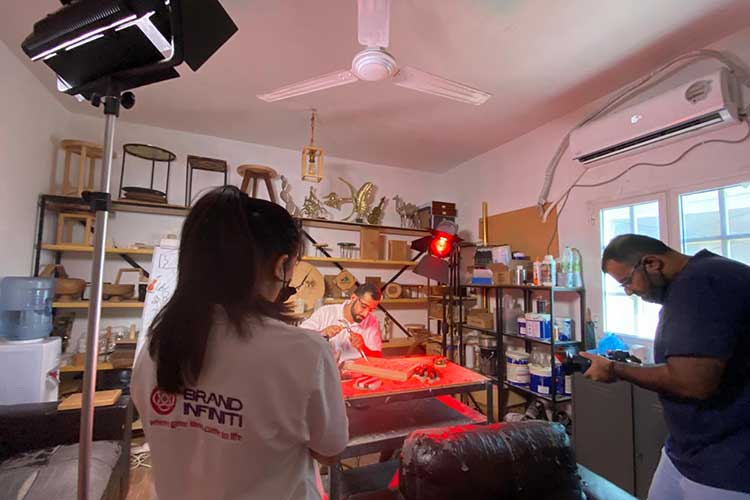Despite the negative aspects of the current pandemic, certain business sectors and trends have certainly seen a drastic rise. Do you feel these trends will continue post pandemic?
I think so, yes. You know, one of the biggest challenges for businesses in the past was attending conferences. The first problem is the travel scheduling, second is the cost. For this reason, I had to continuously struggle with my bosses over the years whenever I wanted to attend an overseas conference. Video conferencing technology has improved massively, with technologies such as broadband and 5G allowing us to deliver extremely high- quality content. Even more advanced technologies are also becoming mainstream such as virtual reality, where people just need to wear their goggles at home, and they will feel like they themselves are in the middle of a crowd inside a conference Hall. They can visit booths as well as virtually touch and experienced products in a manner that is remarkably close to reality.
For now, though, this pandemic has broken this psychological barrier we had against doing things from a distance. So, I think both technology providers as well as businesses will probably continue to push for more virtual meetings and events. Because you can attend more of them at a much lower cost for everybody. Also, this will allow SMEs to host large conferences, which would otherwise be beyond their budget.
I personally have probably never attended these many conferences throughout my life, as I did during the pandemic in 2020. In fact, I am almost attending a conference a day. And they are being organised from around the world, Oman included. So, from a learning point of view, I also learned more. The only thing I miss is the travelling because, as a photographer, I used to always use these business trips and take a few extra days out of my personal leave to just go and do some photography. So yes, I think this pandemic has thought businesses a lot, and a lot of these trends will probably continue post pandemic.
What do you think will be the long-term repercussions of the current situation on the business world in Oman and globally?
I think It depends on the sector. I know that the hospitality and travel sectors were the worst hit, be it hotels, airlines, or entertainment.

Take cinema’s for instance, while production companies themselves didn’t lose as much because they continue streaming their product online, the owners of cinemas lost big. In fact, what was one of the richest industries over the last 20 years, had less than 5% occupancy last year. Worse still, the cinemas don’t only sell film seats, they also sell food and beverages, from which they used to actually make more money. And to top it off, they also lost advertisement revenues.
The repercussions of this will continue for some time because some companies outright went bankrupt and left the market. We have seen a lot of hotels and airlines leave the market, among others. Those companies will not come back anytime soon. It will take them maybe three to five years and even then, they will be coming back to a different world where they cannot continue with the same business model they used to use to have. They will have to come back in a different shape and form, one that will be more resilient to future effects like this.
Unfortunately, with how easy global travelling has become and with the number of people travelling around the world, pandemics like COVID-19 can come at any time now. We have had several nasty outbreaks in the past few decades such as cholera, chicken pox, typhoid, and more. However, they did not spread as quickly as COVID did, because, at the time, people did not travel as much. Now, however, we have mega airport hubs such as London Heathrow, Dubai, Doha, Singapore, and more, where people from all over the world cross each other’s path before heading to their final destinations, be it another airport hub or city. These passengers can easily become infection carriers because, prior to the COVID pandemic, no one used to medically check travellers, allowing such pandemics to spread.
I’m sure necessary technology will be developed, and we’ll find a solution to this problem, but it still won’t be 100% safe. So, we just have to be very careful and prepared in the meantime. Probably, post COVID, there will be some more restrictions on how people travel. One such change could be the return to our immunisation passport, which I remember we all had to carry when we travelled, up until the 1980s. I still remember using the vaccination passport when traveling the first time to the UK in 1980.
But after the 1980s, we have gotten lazy with nobody checking who was immunised and who was not anymore. But I think from now on this procedure will come back and I think it’s a good thing to have, to be honest. I mean, if you are sitting next to a stranger in an aeroplane for ten hours, you would want to make sure he/she is not infected.
They will probably be putting equipment to check the air quality at airports and aeroplanes from now on, so this could also be a good business opportunity for companies. I also expect them to examine air quality from time to time as well as install air purifiers and sanitisers to clean the air, because airports are becoming the largest centre for virus transmission.
The heavy crowd at Dubai Airport during the Christmas and New Year holidays is a very good example. I am sure you have seen images on social media of thousands of travellers queuing back-to-back with no social distancing at Dubai airport, and we all witnessed the consequences a month later. The same thing happened in Europe and the United States during the holiday season with travels and indoor gatherings. Again, a month later, they were hit by the worst numbers of COVID related infections and death.
So, we will continue to face these challenges. However, as we have done in the past, we will hopefully learn from them and new technologies and procedures will come to replace dated ones. While this happens normally anyway, this pandemic will expedite the adoption of many new technologies and introduce new types of businesses, while other technologies, which were previously supposed to stay with us maybe another 10 to 15 years, will probably go away much sooner.
However, I feel some areas and types of business will remain the way they are. But the big question is how are they going to deal with the new world? The restaurant industry and cinemas are a good example of this. TVs are relatively cheap now and you can get a 60-inch 4K or 8K unit quite easily at an affordable price. You can also quite easily recreate a cinema-like experience at home and in a few years be watching programs like football at 8K using streaming technology relatively easily. But a restaurant is different. The experience just isn’t the same when we do it at home. Areas such as shopping malls and airports basically have a concentrated number of people in a very small area. This has become a risk that needs to be addressed. But I’m sure, as always, technology will help solve this problem, as it has always done in the past.


But one thing is for sure, the pandemic has brought to the attention of the government, businesses, and individuals, of just how fragile our overall lifestyle and business structure was; where a tiny virus came and created absolute havoc across the globe. As a result, I think we now have to always include a scenario like this as part of our Plan-B.
I work as the Chairman of an insurance company, Oman Reinsurance Company, where we cover large businesses and government sector organisations. The first thing we do when is assess the risk of the organisation and learn about their Plan-B in case of an emergency. This is because we want to make sure that the organisation has an exit plan if anything goes wrong. Otherwise, we as an insurance company must bail them out completely. But honestly, we never thought about pandemic as a possible business disruption crisis.
For us living here in the Middle East, we’re not into such a culture, but in Europe and North America, insurance culture is very much a thing, and every possible risk area is insured. So, I’m sure insurance companies are facing some major challenges in that aspect. I am fairly sure that insurance companies, be it in Oman or abroad, would not have thought about placing a ‘Pandemic’ as the number one risk it was.
